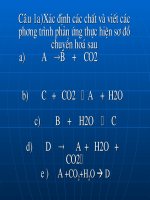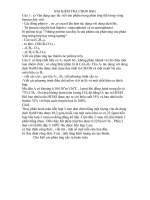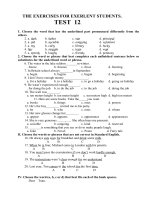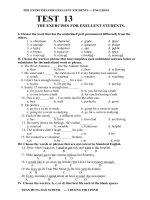BAI TAP BOI DUONG HSG LOP 6.doc
Bạn đang xem bản rút gọn của tài liệu. Xem và tải ngay bản đầy đủ của tài liệu tại đây (412.79 KB, 13 trang )
Tài liệu bồi dưỡng học sinh giỏi lớp 6
Period 1+2 . TENSES
Present
simple
S + V(s-es)
(be): am- is- are
S + don’t/ doesn’t +V
1
S+ am not/ isn’t/ aren’t
Do/Does + S+V
1
?
Am/Is/Are + S+…?
Everyday, usually,
after school, never,
often, sometimes,
always, ...
Present
progressive
S + am/is/are + V-ing S+am/is/are(not)+V-ing Am/ Is/Are +S+V-ing?
Now, at the present, at
the moment, at this
time, Look! Listen, !Be
careful!. Hurry up!
Give the correct form of these verbs:
1. The sun (set) ……………………………………………………………………………in the West.
2. It usually (rain) ……………………………………………………………………………in the summer.
3. They (build) …………………………………………………………………………….
4. Bees (make) ……………………………………………………………honey.
5. They (get) ……………………………………………………………………on the scale now.
6. The earth (circle) ………………………………………………………the Sun once every 365 days.
7. Rivers usually (flow) ………………………………………………… to the sea.
8. Don’t worry. I (give) ……………………………him your message when I (see) ………………………… him.
9. Look! Jane (play) ………………………… the guitar. Hurry up! The bus (come) …………………………… .
10. I (not talk) …………………………………………………… to her at present.
11. How often………………………… she (go) ………………………… fishing?
- She (go) ……………………………………once a year.
12. .............. your friends (be)………………………… students?
-Yes, they (be) ..........................
13. ................ the children (play)………………………………………… in the park at the moment?
-No, they aren’t. They (learn) ...................................... to play the piano.
14. …………………….you (go)………………………….. to school on Sundays? – Yes, I do.
15. My mother (cook) ………………………………………a meal now. She ( cook)…………………… everyday.
16. What……………………… your mother (do)…………………………. at this time?
- She (make)………………………………a dress.
17. ............. she often (go)…………………………… to the cinema every weekend?
18. I don’t know. But she always (go) ......................... to the church on Sundays.
19. The students (not be) ........................................... in class at present.
20. She always (wash) .................................... the dishes after meals.
21. I (do) ........................................... an exercise on the present tenses at this moment and I
(think) ........................................... that I (know) ........................................... how to use it now.
22. My mother sometimes (buy) ........................................... vegetables at this market.
23. It (rain) ........................................... much in summer. It (rain) ........................................... now.
24. Daisy (cook) ........................................... some food in the kitchen at present. She always
(cook) ........................................... in the morning.
Period 3 + 4. PARTS OF SPEECH OF WORD FORMS
I. Danh từ (Nouns):
1. Đònh nghóa: Danh từ là những từ dùng để chỉ sự vật, sự việc hoặc con người.
2. Phân loại danh từ:
- Danh từ đếm được (countable nouns): book, student, table, ...
- Danh từ không đếm được (uncountable nouns): water, grass, information, ....
- Danh từ đơn (simple nouns): war (chiến tranh), bus (xe buýt), ....
- Danh từ kép (Compound nouns): world peace (hòa bình thế giới), bus station (trạm xe buýt), ....
3. Chức năng:
a. Làm chủ ngữ (Subject-): The children go to school every day.
b. Làm tân ngữ động từ và giới từ: (Object): The mother gave a cake to her son
c. Làm bổ ngữ cho chủ ngữ (Sau keep / seem/ be/ feel/ look) (Complement): He is my best friend.
d. Làm bổ ngữ cho tân ngữ (Sau call/ select/ name/....) We call him Tom
II. Đại từ (Pronouns):
1. Đònh nghóa: Đại từ là những từ dùng thay cho danh từ.
2. Phân loại đại từ:
a. Đại từ nhân xưng (Personal pronouns): có 2 loại:
- Đại từ làm chủ ngữ: I/ We/ You/ They/ She/ He/ It
- Đại từ làm tân ngữ: me/ us/ you/ them/ her/ him/ it
b. Đại từ chỉ đònh: This/ that/ these/ those
c. Đại từ bất đònh: (Chỉ người) someone, somebody, no one, nobody, anyone, anybody, everyone
(Chỉ vật) something, nothing, anything, everything
3. Chức năng: Giống danh từ
III. Tính từ (Adjectives):
1. Đònh nghóa: là từ dùng để miêu tả hoặc cho biết thêm chi tiết về danh từ .
2. Phân loại:
a. Tính từ miêu tả: SIZE + SHAPE + AGE + COLOR + NATIONAL + MATERIAL
. (kích thước + hình dạng + tuổi + màu + quốc tòch + chất liệu)
b. Tính từ sở hữu: my/ our / your / their / her / his/ its
c. Tính từ chỉ số lượng: much/ little/ few/ a lot of / plenty of / each/ every/ another
3. Chức năng:
a. Bổ nghóa cho danh từ: A beautiful girl
b. Bổ nghóa cho đại từ: Something new
c. Đứng sau keep / seem/ be/ feel/ look... vàbổ nghóa cho chủ ngữ; He looks happy.
d. Đứng sau keep /make let + O + Adj vàbổ nghóa cho tân ngữ. We make our parents happy.
IV. Trạng từ (Adverbs):
1. Đònh nghóa: là những từ dùng để diển tả tính cách, đặc tính, mức độ, ... và được dùng để bổ nghóa cho động
từ, tính từ, trạng từ khác hoặc cho cả câu.
2. Phân loại:
a. Trạng từ chỉ thể cách: well, carefully, quickly, hard, fast
b. Trạng từ chỉ thời gian: early/ late / yet/ now, today, yesterday, before, after, tomorrow...
c. Trạng từ chỉ mức độ: too much/ too little/ very / extremely/ a lot / nearly
d. Trạng từ chỉ đòa điểm: here/ there/ upstairs/ at home / in the garden...
e. Trạng từ chỉ sự thường xuyên: always/ often/ usually/ sometimes/ hardly/ once a week.....
3. Chức năng:
a. Bổ nghóa cho tính từ: A very beautiful girl
b. Bổ nghóa cho động từ: walk slowly; study hard; play well
c. Bổ nghóa cho trạng từ: walk very slowly; study so hard; play quite well
WORD FORM
1.
NOUN VERB ADJ PARTICIPLE ADV NOTE
2. Anger Angry Angrily Giận
3. Attraction Attract Attractive Attracted Attractively Hấp dẫn
4. Beauty Beautify Beautiful Beautifully Đẹp
5. Business Busy Busily Bận việc
6. Care/ ful/ ness Care Careful/ less Carefully/ lessly Cẩn thận
7. Center Central Centrally Trung tâm
8. Collection Collect Collective Thu thập
9. Curiosity Curious Curiously Tò mò
10. Danger Endanger Dangerous Dangerously Nguy hiểm
11. Death Die Dead Cheat
12. Depth (độ sâu) Deepen (làm) Deep Deeply Sâu
13. Difference Differ Different Differently Khác nhau
14. Difficulty Difficult Difficultly Khó khăn
15. Excitement Excite exciting Excited/ ing Excitingly Hào hứng
16. Friend/ - ship Friendly Bạn bè
17. Fluency Fluent Fluently Trôi chảy
18. Harm Harm (gây hại) Harmful/ less Harmlully/lessly Hại
19. Happiness Happy Happily Hạnh phúc
20. Health Healthy Healthily Mạnh khoẻ
21. Invention Invent Inventory Phát minh
22. Laziness Lazy Lazily Lười biếng
23. Length Lengthen Long Dài
24. Nation/ ality Nationalize National Nước/ qtòch
25. Nature Naturalize Natural Naturally Tự nhiên
26. Pollution Pollute Polluted Ô nhiễm
27. Practice Practice Practical Practically Thực hành
28. Prevention Prevent Preventable Ngăn cản
29. Reason Reason Reasonable Reasonably Lý do
30. Science/ Scientist Scientific Scientifically Khoa học
31. Strength Strengthen Strong Strongly Mạnh
32. Success Succeed Successful Successfully Thành công
33. Warmth Warn Warm Warmly Ấm áp
34. Width Widen Wide Widely Rộng
35. Wonder Wonder Wonderful Wonderfully Kì diệu
Period 5+6. IDENTIFICATION OF WORD FORMS
I. Chọn danh từ: (đầu câu, sau độïng từ và giới từ)
- A, AN, THE
- THIS/ THAT/ THESE/ THOSE
- MY/ OUR / YOUR / THEIR / HER / HIS/ ITS
- EACH/ EVERY, BOTH , NO
- FEW, A FEW, LITTLE, A LITTLE, ENOUGH
- SOME/ ANY/ MANY, MUCH, A LOT OF
THE MOST /BEST....
−
+ NOUN (Danh từ)
II. Chọn tính từ: Trước danh từ, sau linking verbs,
- ADJ + NOUN
- KEEP / SEEM/ BE/ FEEL/ LOOK + ADJ:
A happy girl always smiles. (happiness)
- Linking verbs: He’s heavy. ( heaviness)
III. Chọn trạng từ: Giữa chủ ngữ và động từ / sau động từ thường, sau tân ngữ. đầu câu, ...
- S + ADV + V(thường):
- S + V (+ O) + ADV
- ADV , S + V
-I have recently received my friend’s letter.
-The doctor told me to breathe in slowly.
-Suddenly , he saw an accident.
IV. Chọn động từ: đứng ngay sau chủ ngữ:
- S + V:
-My mother bought a new bike yesterday.
V. Complete the sentences using the correct form of the words in brackets.
He feels very …………..............……….………so he talks …………..............……….……… Anger
She looks…………..............……….………in her new coat. Attraction
He plays soccer …………..............……….……… Beauty
Nam is always …………..............……….………. He is on his ……............……….……… this week. Business
Mr. Han is a …………..............……….……… driver. He drives …………..............……….……… Care
I live on …………..............……….……… highland in Dalak. Center
Hoa has a fine …………..............……….……… of stamp. Collect
His …………..............……….……… helps him successful. Curious
AIDS is a………..............……….disease Danger
Her parents’ …………..............……….……… makes her very sad. Death
Mai understands me …………..............……….……… Depth (độ sâu)
There is no …………..............……….……… between my answer and his. Differ
We have a lot of …………..............……….……… in learning English. Difficult
The is an…………..............……….……… football match this afternoon. Excite
We are very proud of our………..............………. Friend
He speaks English …………..............……….……… Fluency
If you smoke, it is …………..............……….……… to you. Harm
She sent her best wishes for my future…………..............……….……… Happiness
He does exercise every morning, so he is very…………..............……….……… Health
Exercises …………..............……….………your health. Strong
…………..............……….………students don’t often succeed in the tests. Laziness
. ………..............……….are trying to find out new stars. Science
Nam is very…………..............……….……… and heavy. Strength
I don’t like hot weather. I like…………..............……….……… weather Warmth
Ha Long Bay is a …………..............……….……… Bay. Wonder
Period 7+8. ADVERB CLAUSES OF TIME & REASON
A. ADVERD CLAUSES OF TIME:
Là mệnh đề trạng ngữ chỉ thời gian bắt đầu các liên từ When, while, after/ before, as (khi), until (đến khi )
S +V+ When/ while/ after/ before/ as/until + S + V
Chỉ tương lai: When he comes tomorrow, we will welcome him.
Chỉ hiện tại: When it’s hot, I go swimming. / As I come, he is eating.
B. ADVERD CLAUSES OF REASON:
Là mệnh đề trạng ngữ chỉ lý do hay nguyên nhân bắt đầu các liên từ: because/ since/ as (bởi vì)
S + V + because/ since/ as + S + V
Mr. Ba is late because/ since/ as she oversleeps.
Because Lan and Ba don’t have a tent, they never go camping.
C. Join two sentences into one, use because/ since/ as:
1. Lan and Ba never go camping. , so they don’t have a tent
...................................................................................................................................................
2. I stay at home. It rains.
...................................................................................................................................................
3. Tan is late for school. He misses the bus.
...................................................................................................................................................
4. The weather is fine. We have a picnic on the mountain.
...................................................................................................................................................
5. I don’t have a bike, so I walk.
...................................................................................................................................................
6. Nhan is free, so he flies his kites.
...................................................................................................................................................
D. Join two sentences into one, use when/ while/ after/ before/ as/until:
1. It is warm. I go fishing. (when)
...................................................................................................................................................
2. My father is eating. My mother cooks. (while)
...................................................................................................................................................
3. I take a bath first. Then I eat. (before)
...................................................................................................................................................
4. Mr. Quang waits for the farmer. The farmer comes. (until)
...................................................................................................................................................
5. He will come tomorrow. We will welcome him. (When)
...................................................................................................................................................
6. You will go the museum. You will see a lot of valuable pictures. (When)
...................................................................................................................................................









